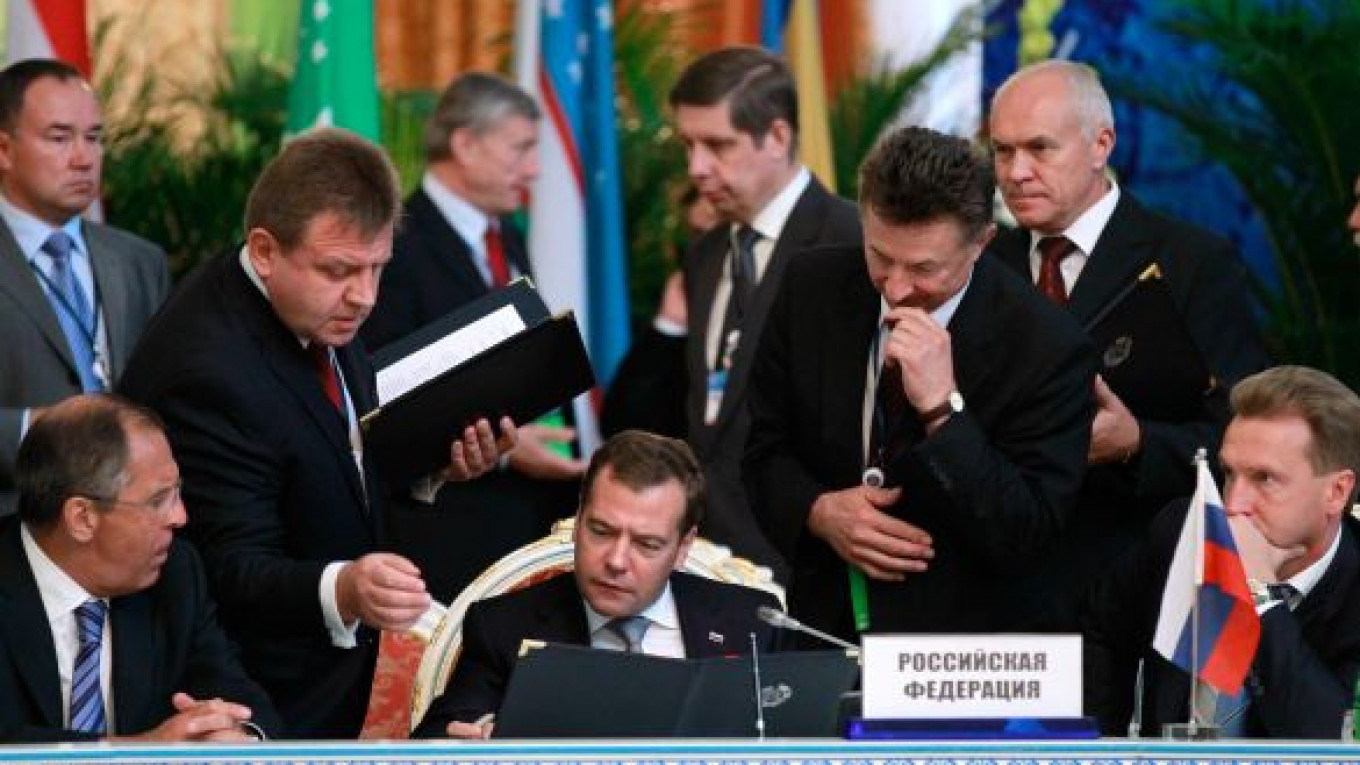DUSHANBE, Tajikistan — President Dmitry Medvedev on Saturday accused the Organization for Security and Cooperation in Europe of using double standards and attempting to influence the internal affairs of some former Soviet nations.
Medvedev, speaking at a summit of the Moscow-led Commonwealth of Independent States, uniting 11 former Soviet states, rapped the OSCE's Office for Democratic Institutions and Human Rights for sending "huge delegations" to monitor elections.
"Those international observers who come representing the OSCE at times openly demonstrate a politicized approach to the assessment of preparations for elections and of the way they are conducted," he told the summit, held in the Tajik capital. "Let's call a spade a spade — this approach is often based on double standards."
The OSCE's Office for Democratic Institutions and Human Rights wants to send a team of observers to monitor the State Duma elections in December. Voters will cast ballots in a presidential election three months later.
Medvedev made clear that he saw a negative assessment of elections in Russia and other former Soviet states by the OSCE as a means to bolster opposition forces in these states — a view also aired by Prime Minister Vladimir Putin.
"Naturally, all of us are striving for free and democratic elections, but this does not mean open access for any external force that could try to shape the internal situation in our states from abroad," Medvedev said.
In contrast to their Western colleagues, observer missions from CIS nations have routinely issued highly complimentary reports about presidential and parliamentary elections held even in the most authoritarian states, including Belarus and the countries of Central Asia.
Nikolai Bordyuzha, who heads the Moscow-dominated Collective Security Treaty Organization, echoed Medvedev's concerns, saying the string of Arab Spring revolutions showed that foreign forces "can rock the situation in any country."
"These [events] have opened our eyes to many things," he told reporters on the sidelines of the summit.
"Because every state has an infrastructure that can be used to rock the situation, such as information resources, controlled or funded by other states, nongovernmental organizations and foundations," he said. "There are professional revolutionaries trained elsewhere — specifically to make revolutions happen in their own countries."
Bordyuzha declined to answer questions on whether the CSTO, which includes rapid reaction units from Russia and six other CIS states, could use force to quell protests in any of its members.
The CSTO did not send troops to stop ethnic riots in its member Kyrgyzstan in June last year, when more than 400 people were killed.
A Message from The Moscow Times:
Dear readers,
We are facing unprecedented challenges. Russia's Prosecutor General's Office has designated The Moscow Times as an "undesirable" organization, criminalizing our work and putting our staff at risk of prosecution. This follows our earlier unjust labeling as a "foreign agent."
These actions are direct attempts to silence independent journalism in Russia. The authorities claim our work "discredits the decisions of the Russian leadership." We see things differently: we strive to provide accurate, unbiased reporting on Russia.
We, the journalists of The Moscow Times, refuse to be silenced. But to continue our work, we need your help.
Your support, no matter how small, makes a world of difference. If you can, please support us monthly starting from just $2. It's quick to set up, and every contribution makes a significant impact.
By supporting The Moscow Times, you're defending open, independent journalism in the face of repression. Thank you for standing with us.
Remind me later.






